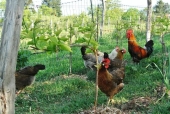




 1
1




If the gods can make it,i can shape it.




 1
1




 1
1




Liz
 1
1




 1
1




Pecan Media: food forestry and forest garden ebooks
Now available: The Native Persimmon (centennial edition)












Kim Sleuwaegen wrote:
To hear it did not have any negative effects even from a wild nest sooths some of my concerns. Any idea how much time between the burying end the planting into it?
Pecan Media: food forestry and forest garden ebooks
Now available: The Native Persimmon (centennial edition)

| I agree. Here's the link: http://stoves2.com |

